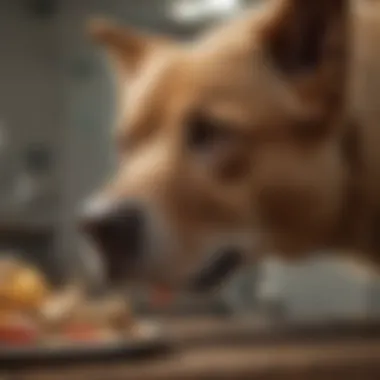Dietary Solutions for Dog Diarrhea Relief


Intro
When it comes to our canine companions, digestive health is crucial. Diarrhea can be a frequent concern for dog owners, often causing distress for both pets and their humans. Understanding what to feed your dog during such episodes can significantly aid in recovery. This guide will delve into various dietary solutions to alleviate diarrhea, while emphasizing the importance of observing your dog for specific needs.
Understanding Your Pet
Breed Traits
Certain dog breeds have digestive systems that may be more sensitive than others. For example, breeds such as Chihuahua and Yorkshire Terrier often suffer from gastrointestinal issues due to their small stature. Larger breeds, like Great Danes, may also experience diarrhea due to their size and tendency to consume food quickly. Recognizing these traits can guide you in selecting the right dietary approach.
Common Temperaments
Understanding your dog’s temperament is equally important. Some dogs are more anxious, which can lead to gastrointestinal disturbances. If your dog tends to experience stress, maintaining a calm eating environment is essential. This can positively impact their digestion and overall health.
Special Needs
Dogs with specific health conditions, such as pancreatitis or food allergies, require tailored diets. Always consult a vet to determine suitable diet modifications, especially if your pet has known health issues.
Pet Care Essentials
Nutrition and Feeding Guidelines
When addressing diarrhea, it's essential to modify your dog’s diet appropriately. Here are some dietary adjustments that may help:
- Bland Diet: Start with a bland diet of boiled chicken and plain rice for 24 to 48 hours.
- Pumpkin: Adding canned pumpkin can provide fiber that helps firm up stools.
- Probiotics: Consider incorporating vet-approved probiotics to restore gut flora.
- Hydration: Ensure your dog stays hydrated. Fresh water should always be available, and an electrolyte solution can also be beneficial.
Grooming Tips and Techniques
While grooming may not directly relate to diarrhea, keeping up with your dog's hygiene can prevent additional health issues. Regular grooming helps identify skin problems or other conditions that could contribute to digestive disturbances.
Health and Wellness
Regular vet check-ups are vital. Routine examination can help catch potential health problems before they worsen. If diarrhea persists, immediate consultation is advised to rule out more serious conditions.
Training and Behavior
Basic Training Techniques
Training your dog not to eat things off the ground can help prevent dietary indiscretions that lead to gastrointestinal issues. Simple commands like
Understanding Canine Diarrhea
Understanding canine diarrhea is crucial for every dog owner. It reflects not just a physical ailment but also indicates underlying health issues that may require attention. By grasping what diarrhea signifies, you can tailor your dog's diet and improve overall digestive health. This section sheds light on the causes and symptoms of diarrhea, guiding owners towards effective dietary adjustments.
What Causes Diarrhea in Dogs
Diarrhea in dogs can arise from various factors. Some of the common causes include:
- Dietary indiscretion: Dogs are known for their curious appetites. Consuming spoiled food or garbage can upset their stomachs.
- Food allergies or intolerances: Some dogs may react negatively to certain ingredients in their food. This can lead to digestive disturbances, including diarrhea.
- Infections: Bacterial, viral, or parasitic infections can also cause diarrhea. These pathogens can introduce harmful substances into your dog's system.
- Medications: Certain medications, such as antibiotics, may disrupt the normal gut flora, resulting in diarrhea.
- Chronic diseases: Conditions like inflammatory bowel disease or pancreatitis can cause ongoing diarrhea. Recognizing these nuances is essential for appropriate feeding strategies.
It is essential to identify the specific cause of diarrhea before making any dietary changes. Tracking your dog’s eating habits, environment, and any recent changes in diet can help pinpoint the problem.
Common Symptoms and Signs
Observing your dog for symptoms of diarrhea is vital. Apart from loose stools, other signs may include:
- Increased frequency of bowel movements: An upsurge in the number of times your dog goes can be a clear indicator.
- Abdominal discomfort: Signs of bloating or cramping can accompany diarrhea.
- Vomiting: Some dogs may vomit along with diarrhea, indicating further digestive distress.
- Lethargy: A decrease in energy levels may occur, along with a reluctance to eat.
- Changes in appetite: An abrupt drop or increase can signify underlying issues.


Monitoring these signs allows for timely interventions. Early recognition of serious conditions can lead to better outcomes.
By understanding these aspects of canine diarrhea, you are better equipped to make informed decisions about your dog's diet and overall care.
The Role of Diet in Digestive Health
Diet plays a vital role in maintaining digestive health for canines. What a dog eats directly influences its digestive processes. Therefore, pet owners must pay close attention to their dog’s diet, especially during episodes of diarrhea. Understanding how food affects digestion can aid in preventing further digestive disturbances.
How Food Affects Digestion
Food intake triggers a complex series of reactions within a dog's digestive system. The digestive tract breaks down food into nutrients that the body can absorb. The type of food significantly impacts this process. Highly processed foods can lead to an imbalance in gut bacteria, which can result in diarrhea.
A high-fiber diet can be beneficial for dogs experiencing mild diarrhea. Fiber helps to absorb excess moisture in the intestines, aiding in firming up the stool.
In contrast, rich or greasy foods may irritate the stomach and intestines, worsening diarrhea. Always consider the source of the food. Natural and simpler ingredients allow for easier digestion. Relying on diets high in artificial additives may lead to digestive issues. Also, sudden changes in food can upset a dog's stomach. Gradual transitions are essential to prevent further diarrhea.
The Importance of Nutritional Balance
Maintaining a balance of nutrients is crucial for overall health and stability in your dog’s digestion. Dogs require a blend of protein, fats, carbohydrates, vitamins, and minerals in their diet. When a digestive issue arises, the right nutrients can support recovery.
Proteins are essential as they help repair the gut lining, while carbohydrates provide energy. Fiber, as mentioned, aids digestion. It's vital to include ingredients known to soothe digestive issues, like pumpkin or sweet potatoes, as they provide a gentle source of fiber.
Vitamins and minerals maintain system functions, and ensuring they are included is fundamental. Not enough nutritional balance can lead to deficiencies, making the dog more susceptible to health issues. Proper diet planning considering these factors is integral to long-term digestive health.
A well-balanced diet is not just about recovery; it is foundational for the dog's overall digestive system resilience.
Initial Dietary Adjustments for Diarrhea Relief
Initial dietary adjustments are crucial in providing immediate relief for dogs experiencing diarrhea. Rapid changes in diet can sometimes exacerbate gastrointestinal disturbances. It is essential that any adjustments made are both thoughtful and deliberate. The right foods can help firm up stools and restore normal digestion.
Bland Diet Options
Rice
Rice is commonly recommended for dogs dealing with digestive issues. It is easily digestible and low in fiber, which helps to settle the stomach. One of the key characteristics of rice is its high starch content, which can absorb excess water in the intestines. This makes it a favorable option for a bland diet.
The unique feature of rice lies in its simplicity. Many dog owners have rice available at home, which can help in quick preparation. Rice is a beneficial choice because it does not irritate the intestinal lining. However, it's important to avoid seasoning it, as added spices or oils can worsen the situation.
Boiled Chicken
Boiled chicken is another solid option for dogs with diarrhea. The primary quality of boiled chicken is its lean protein, which aids in rebuilding and strengthening the dog's body after a bout of diarrhea. It's recommended to use skinless and boneless chicken to avoid any potential fatty irritants.
What makes boiled chicken stand out is its palatability. Many dogs find it appealing, which encourages them to eat when they may otherwise refuse food. However, one should ensure it is served plain, without any added salts or spices. This option should be closely monitored to prevent any adverse effects if the dog does not handle it well.
Pumpkin
Pumpkin is effective for managing canine diarrhea due to its high fiber content. Fiber can help absorb excess water in the digestive tract, firming up loose stools. The key characteristic of pumpkin is its natural richness in vitamins and minerals, contributing positively to overall health.
Pumpkin's unique feature is its versatility — it can be easily mixed with both rice and boiled chicken, making it a popular addition to bland diets. It is a beneficial choice, especially for dogs who may need a little flavor in their meals. Nonetheless, pet owners should use plain canned pumpkin or fresh pumpkin, avoiding seasoned or sweetened varieties.
Hydration and Electrolytes
When a dog experiences diarrhea, maintaining hydration is critical. Diarrhea leads to a loss of fluids and electrolytes, which can result in further complications if not addressed. Providing ample clean water is essential, but sometimes that may not be enough. It may become beneficial to consider electrolyte solutions specifically formulated for dogs.
Adding a small amount of low-sodium chicken broth to your dog's water can encourage them to drink more. Additionally, offering ice cubes made of broth can provide relief and hydration. Always monitor your dog’s fluid intake closely during recovery, ensuring they remain hydrated and stable throughout the process.
Transitioning Back to Regular Food
When your dog experiences diarrhea, it is crucial to approach the reintroduction of regular food carefully. Transitioning back to the dog's standard diet helps ensure that the digestive system can adapt without being overwhelmed. This process, when done properly, can prevent further gastrointestinal disturbances that may arise from sudden dietary changes. The key aspects to consider in this transition include time, monitoring, and food selection. A gradual return to the normal diet minimizes the risk of re-triggering diarrhea and promotes overall digestive health.


Gradual Prolusion of Original Diet
Once your dog's symptoms have improved, you can start to reintroduce their regular food. This should not be done hastily. It is best to begin by mixing a small amount of the original food with the bland diet you have used during the recovery phase. An effective guideline is to follow a ratio system. Start with roughly one part original food to three parts bland diet. Over the next few days, gradually increase the portion of the original food while decreasing the bland food. This approach allows the dog's digestive system to adapt slowly to the more complex nutrients of their usual diet.
Sample Gradual Feeding Schedule:
- Day 1-2: 1 part original food, 3 parts bland diet
- Day 3-4: 1 part original food, 2 parts bland diet
- Day 5-6: 1 part original food, 1 part bland diet
- Day 7: Full original diet
By keeping an eye on your dog during this time, you can observe how they are handling the food. If any signs of diarrhea recur, it may be necessary to halt the reintroduction and sit back with only the bland diet until further improvement is seen.
Monitoring Tolerance
As you reintroduce your dog's original diet, monitoring their tolerance is crucial. Each dog is unique, and their reaction to certain ingredients can vary significantly. Watch for any signs of gastrointestinal distress such as loose stool, vomiting, or excessive gas.
- If your dog displays any of these symptoms, pause the transition immediately and revert to a bland diet.
- Once the symptoms subside, you can try to reintroduce the original food again, but do it more slowly this time.
It can also be beneficial to keep a diary for tracking your dog’s progress. Record changes in their health, stool consistency, and appetite. This information may provide valuable insights should you need to consult your veterinarian later.
Remember, patience is essential. Rushing can lead to setbacks.
Taking these steps to carefully transition back to a regular diet is an important part of promoting long-term digestive health for your dog. It fosters a stable environment for recovery and prepares the digestive system for future challenges. The goal is to ensure your pet's comfort and well-being through thoughtful dietary management.
Commercial Diets for Dogs with Digestive Issues
Commercial diets for dogs with digestive issues provide specific nutrition solutions aimed at addressing gastrointestinal distress. The significance of these diets lies in their formulation, which targets common digestive problems like diarrhea. Understanding the options available can empower pet owners to make informed choices regarding their dog's diet during such episodes.
Prescription Diets
Prescription diets are tailored to resolve specific health concerns, including digestive challenges. These diets often undergo rigorous testing and formulation, ensuring they meet the unique needs of dogs experiencing gastrointestinal issues.
Key Components
A key component of prescription diets includes highly digestible ingredients. Such formulations are often low in fat and fiber, making them easier for a dog's digestive system to process. This characteristic is essential, as it reduces the workload on the intestines, promoting recovery from diarrhea. Moreover, these diets typically feature controlled protein levels to help in managing inflammation. The unique feature of these diets is their veterinary approval, which adds a level of credibility and reassurance for owners. However, one must consider that pescription diets might be more expensive than standard dog food, but their formulation justifies the cost for optimal health.
Benefits
The benefits of prescription diets are multifaceted. Firstly, they have proven efficacy in stabilizing digestive health in dogs with existing issues. Secondly, many of these diets contain added nutrients such as prebiotics and probiotics, which assist in restoring gut flora. This is a significant advantage, as it aids in quick recovery from diarrhea. Owners often find these diets a popular choice for their documented improvements in their dog's condition. However, transitioning to such diets should be done under veterinary supervision to ensure proper adaptation.
Over-the-Counter Options
For pet owners looking for convenient alternatives, over-the-counter options exist. These products do not require a vet's prescription and can provide relief at home. While some may not be as specialized as prescription diets, many are formulated with easily digestible ingredients and can serve as a temporary solution. It is important to check labels for key ingredients like rice, chicken, and pumpkin, which are known to support digestive health. However, effectiveness may vary based on individual dog needs, so monitoring is essential.
Always consult with a veterinarian before making significant dietary changes, especially in cases of ongoing digestive distress.
Homemade Diets: Pros and Cons
Homemade diets for dogs can be a consideration for pet owners addressing canine diarrhea. Making meals at home allows control over ingredients, potentially benefiting digestive health. However, there are both advantages and factors to weigh. This section will explore the pros and cons of homemade diets, helping pet owners make informed choices.
Benefits of Homemade Meals
- Ingredient Control: Pet owners can choose high-quality ingredients free from additives or preservatives, tailoring meals to suit their dog's needs.
- Digestibility: Many dogs experience fewer gastrointestinal issues with homemade diets. The simplicity of ingredients, when compared to store-bought options, may lead to better digestion.
- Customizable Recipes: Dog owners can modify recipes based on their dog's specific health requirements, preferences, or food intolerances. This flexibility ensures that each canine gets the nutrients necessary for optimal health.
- Freshness: Preparing meals at home typically guarantees fresher ingredients, rather than relying on commercially processed dog food.
- Bonding Experience: Cooking for a pet can also enhance the bond between the owner and the pet, as it demonstrates care and effort in providing well-balanced nutrition.
Challenges and Risks
- Nutritional Imbalance: One major concern is that homemade diets might lack essential nutrients. Maintaining a balanced diet is crucial, and creating one without expert guidance can lead to deficiencies.
- Time Investment: Preparing homemade meals requires significant time and effort. For busy owners, this might become challenging, leading to inconsistent meal preparation.
- Potential for Safety Hazards: If not prepared correctly, homemade meals risk contamination. Owners must ensure that they follow food safety practices to avoid any health risks.
- Limited Shelf Life: Homemade dog food usually has a shorter shelf life than commercial options. This means it needs to be consumed quickly or stored properly to prevent spoilage.
- Veterinary Guidance Needed: It is crucial to consult a veterinarian before changing a dog's diet significantly. A veterinarian can guide suitable recipes and help evaluate any possible risks.
Consulting with Veterinarians
When faced with canine diarrhea, the importance of consulting with a veterinarian cannot be overstated. Vets provide crucial insights that assist pet owners in not only addressing the immediate issue but also in understanding its underlying causes. They possess the expertise to determine if the diarrhea is a symptom of a more serious health concern or simply a result of dietary missteps. Consulting a veterinarian is essential for establishing a comprehensive treatment plan that supports the dog's overall well-being in the long term.


Benefits of Consulting a Veterinarian
- Professional Diagnosis: Vets can identify the root causes, ranging from dietary indiscretion to infections or other health issues.
- Tailored Recommendations: Each dog is unique, and professional guidance ensures specific dietary strategies suited to the dog's health status.
- Preventive Care: Regular veterinarian consultations can help avoid future gastrointestinal disturbances by allowing the owner to establish optimal dietary practices and health monitoring.
The time spent consulting a veterinarian is a worthwhile investment in your pet's longevity and health. This professional advice can save time, worry, and ultimately, money in the long run.
When to Seek Professional Advice
Diarrhea is not always life-threatening, but certain indicators suggest that professional advice is necessary. Pet owners should seek veterinary assistance in the following situations:
- Duration: If diarrhea persists for more than 24 to 48 hours, it is wise to consult a veterinarian.
- Severity: Any signs of dehydration, such as lethargy, sunken eyes, or dry gums, indicate that immediate veterinary care is needed.
- Accompanying Symptoms: If diarrhea is accompanied by vomiting, fever, or loss of appetite, these may signal a more serious condition requiring veterinary attention.
- Age and Health Status: Puppies, senior dogs, or those with pre-existing health conditions are at greater risk and should be assessed promptly by a veterinarian.
Recognizing these signs swiftly ensures the best chance for recovery and restoration of normal digestive health.
Potential Diagnostic Tests
Once at the veterinarian's office, several diagnostic tests may be employed to assess the underlying cause of diarrhea. Common tests include:
- Fecal Examination: This test checks for parasites, bacteria, or other signs of infection. It is standard practice when dogs experience gastrointestinal disturbances.
- Blood Work: A complete blood count and biochemistry panel can reveal systemic diseases, organ dysfunction, or evaluate hydration levels.
- Imaging: Radiography or ultrasound can provide insight into potential obstructions or abnormalities in the gastrointestinal tract.
- Food Allergy Testing: If food allergies are suspected, specific tests may be recommended to identify possible allergens in the diet.
Veterinary diagnostics offer clarity and help establish an appropriate course of action for effective management of diarrhea, and supporting the dog’s recovery. If you suspect something is not right with your dog, do not hesitate to seek professional guidance.
Preventative Measures for Future Digestive Disturbances
Preventative measures are crucial in maintaining your dog's digestive health and can significantly reduce the risk of recurring diarrhea. Understanding the factors that contribute to digestive disturbances helps pet owners take proactive steps towards a more stable and healthy gut for their dogs. Adopting preventative measures is about consistency, awareness, and making informed decisions regarding your dog's diet and health.
Routine Dietary Guidelines
Creating a comprehensive dietary plan is foundational in preventing diarrhea episodes. Some routine dietary guidelines include:
- Balanced Nutrition: Ensure that your dog’s diet contains all the necessary nutrients. This includes proteins, carbohydrates, healthy fats, vitamins, and minerals, all properly balanced.
- Quality Ingredients: Choose dog foods made from high-quality ingredients. Avoid foods with fillers or artificial preservatives that could upset your dog's stomach.
- Incremental Changes: When introducing new food, do it gradually. A sudden change can shock your dog’s digestive system and lead to diarrhea.
- Regular Variety: Incorporate different sources of protein and vegetables to provide variety in your dog's meals. This can help in preventing food sensitivities.
- Avoid Human Foods: Some human foods are hazardous to dogs. Foods like chocolate, onions, and grapes can lead to serious health issues, including digestive problems.
These guidelines lay the groundwork for a steady diet, helping to minimize the chances of your dog suffering from diarrhea.
Importance of a Consistent Feeding Schedule
Establishing a consistent feeding schedule is equally vital. Timing can significantly impact your dog’s digestion. Here are reasons why a routine is important:
- Predictability: Dogs thrive on routine. Regular feeding times help their bodies adapt and anticipate meals, resulting in a more regulated digestive process.
- Prevention of Overeating: By providing meals at specific times, you can prevent your dog from overeating, which can lead to digestive upset.
- Easy Monitoring: A consistent schedule makes it easier to monitor your dog's eating habits and identify any unusual changes. Sudden changes could signal a health issue.
- Stability in Digestion: A stable feeding time supports a regular digestive cycle, promoting overall gut health which is essential in reducing the risk of diarrhea.
A consistent and well-planned feeding schedule can significantly improve your dog's digestive health and enhance their overall well-being.
Implementing these preventative strategies will not only address the immediate issues surrounding diarrhea but also foster long-term digestive health for your dog. Attention to dietary habits alongside proper scheduling reflects a commitment to your dog’s quality of life.
End
Different feeding strategies like implementing a bland diet or considering both prescription and over-the-counter commercial diets have been outlined. Each option offers unique benefits that cater to different dietary needs and preferences. By understanding the significance of nutritional balance and the role of food on digestion, owners can make informed decisions that directly impact their dog's recovery and health.
It is also imperative to recognize the importance of preventative measures. Consistent feeding schedules and regular monitoring of dietary changes can help mitigate future digestive disturbances.
Pet owners should strive to maintain an open line of communication with their veterinarians, as professional guidance is instrumental in ensuring a dog's long-term digestive health.
Summary of Key Points
This article has addressed several pertinent points regarding canine diarrhea and its management through diet:
- Understanding the causes of diarrhea and its symptoms allows for early intervention.
- Initial dietary adjustments, including bland diet options like rice and boiled chicken, can provide immediate relief.
- Commercial diets, whether prescription or over-the-counter, offer structured nutritional support for dogs with digestive issues.
- Homemade diets can be beneficial, yet they come with challenges that owners must navigate carefully.
- Consulting with a veterinarian is crucial when diarrhea persists or worsens.
- Preventative measures, such as routine dietary guidelines and consistent feeding schedules, are essential for maintaining digestive health.
Encouragement for Proactive Care
Proactive care is necessary for every pet owner. Monitoring a dog's diet and behavior is an ongoing responsibility. By staying informed and observant, owners can catch potential health issues early. Regular check-ups with veterinarians help in maintaining a dog’s health and developing tailored dietary plans suited to their specific needs.
Simple adjustments can lead to significant changes in a dog's digestive health. Owners should not hesitate to explore options like blending traditional and commercial diets as needed. By doing so, they provide their pets with the best chance for a healthy and happy life. It is a small effort that ensures better outcomes for their furry companions.
This holistic approach fosters not only immediate health improvements but also long-term wellness for dogs.



